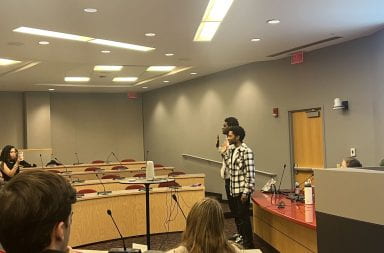Great athletes must often overcome great adversity to reach their full potential.
Brandon Wynn, a junior gymnast for Ohio State, faced his biggest challenge following the 2009 season.
After being ranked at the top of the nation on the rings all season, Wynn fell on his dismount in one of the qualifying events for the NCAA Championships.
“Heartbreaking” is how Wynn described the incident.
This season, the same story played out. Wynn was ranked No. 1 all season, and he won all 10 events that he participated in.
But this time, Wynn succeeded, winning the national championship on rings in April.
“It felt awesome,” Wynn said.
Coach Miles Avery was proud, but not wholly surprised.
“It was expected,” he said. “He gained a lot of experience through not winning (last year).”
“He had the maturity of knowing he didn’t have to do anything amazing (to win), but others would,” said Avery, who has coached five other national champion gymnasts while at OSU.
His experience from the 2009 season was essential for this year’s success, but Wynn’s preparation began at a young age.
Unofficially, his training began in his backyard.
“I had a pool and a diving board when I was a kid,” Wynn said.
But formally, Wynn began with gymnastics when he was 7. When he was 12 or 13, Wynn noticed he was more focused than the other members of his class, he said.
It was then that he decided to get all he could out of his abilities.
Wynn said he might not be the most talented gymnast out there, but he works as hard as he possibly can.
Even if competitions did not go his way, he knew that how hard he worked was an aspect of gymnastics that he could completely control.
Though all his hard work has paid off in a national championship, Wynn doesn’t have much time to enjoy his victory.
Wynn is traveling to Moscow to compete in the FIG World Cup on May 14 and 15.
“I definitely have to look at the final goal (2012 Olympics), but I have to focus on the next event,” said Wynn, originally from Voorhees, N.J.
Getting on the Olympic team depends on the decision of a committee, Wynn said.
And with only five gymnasts selected to the team and six events at the Olympics, Wynn described the individual team members as “puzzle pieces.”
The committee has to match the strengths and weaknesses of each gymnast to form a team, Wynn said.
“I am just going to lay all my cards on the table,” he said. “That’s all you can do.”
After the 2012 Olympics, Wynn is planning to retire from competitive gymnastics.
He is not averse to coaching gymnastics one day, but his future career as an entrepreneur is growing quickly.
Wynn, who is majoring in consumer and family financial services, is already pretty far along in starting his own business, he said.
He and a few colleagues have developed a resistance band-based piece of equipment and are hoping to launch it fairly soon, along with their own nutrition and workout regimen, he said.
If his gymnastics career is any indication, Wynn is likely to succeed, no matter how hard he has to work.


